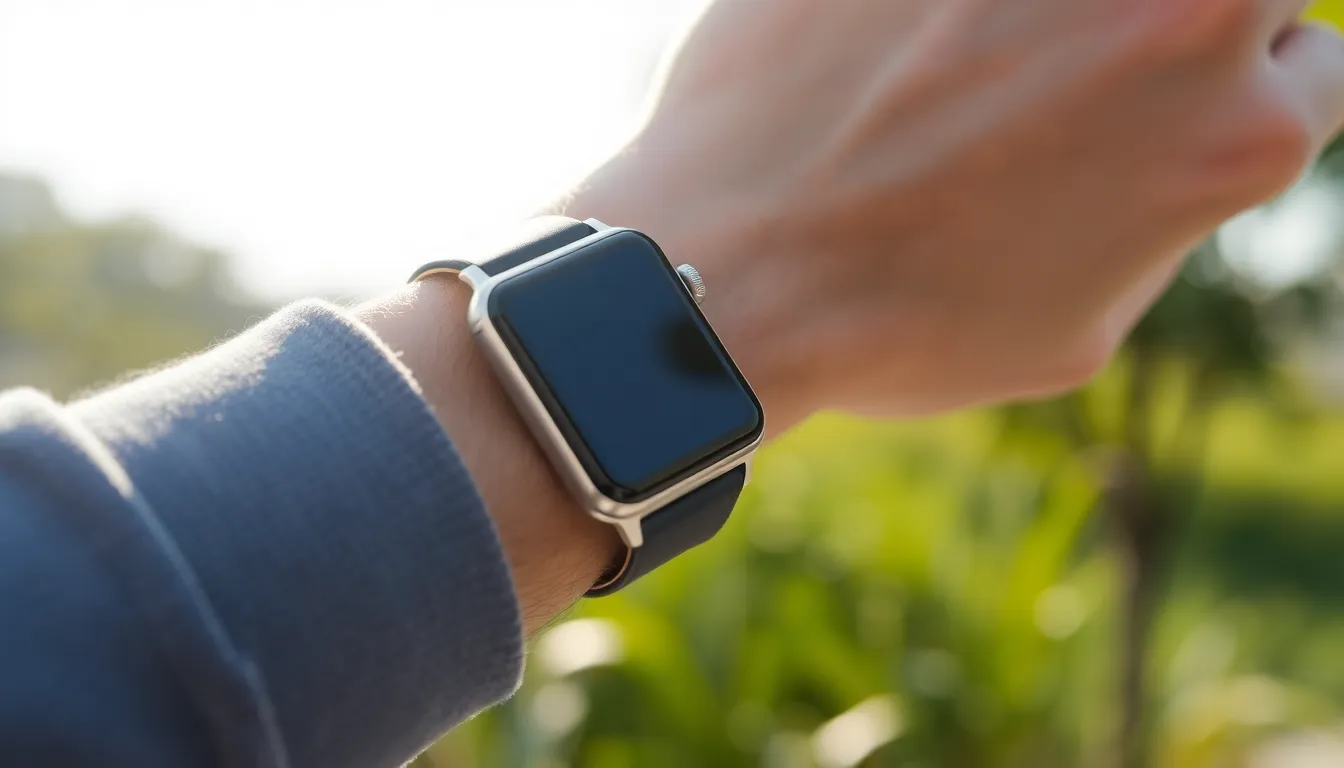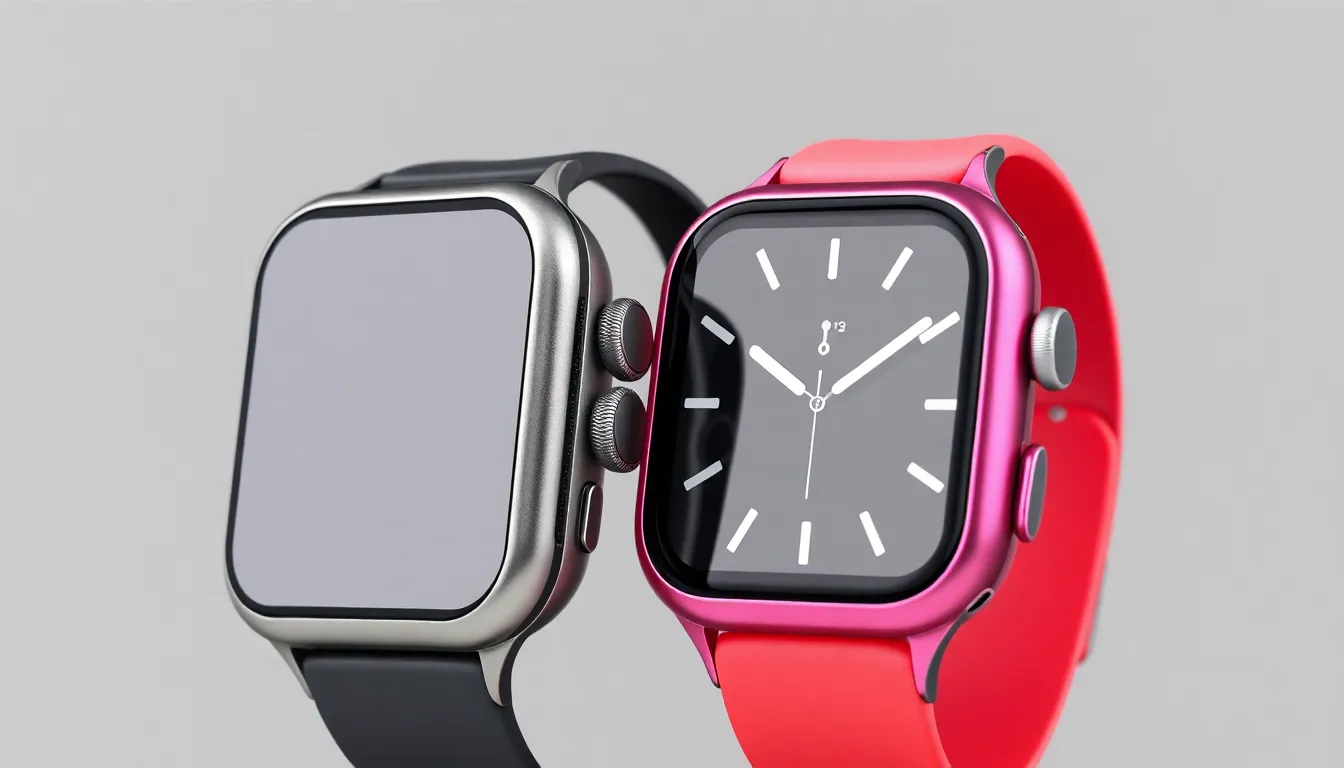When choosing an Apple Watch, the material can significantly impact both style and durability. Two popular options are aluminum and titanium, each offering unique benefits that cater to different lifestyles and preferences. Aluminum is lightweight and budget-friendly, making it a great choice for everyday wear. On the other hand, titanium boasts superior strength and a premium feel, appealing to those who prioritize luxury and durability.
Understanding the differences between these materials can help users make an informed decision. Whether it’s the sleek look of aluminum or the robust nature of titanium, each choice reflects personal taste and functionality. Dive into the comparison to discover which Apple Watch material suits your needs best.
Table of Contents
ToggleOverview of Apple Watch Materials
Apple Watch materials play a crucial role in defining the device’s performance and user experience. Two primary materials used in Apple Watches are aluminum and titanium, each offering unique characteristics and advantages.
Aluminum
- Weight: Aluminum is significantly lighter than titanium, making it comfortable for all-day wear.
- Affordability: Aluminum models typically cost less than their titanium counterparts, making them accessible options for many users.
- Durability: While less durable than titanium, aluminum still offers decent resistance to everyday wear and tear with proper care.
- Variety: Aluminum is available in multiple colors and finishes, allowing users to customize their watch to suit their style.
Titanium
- Strength: Titanium exhibits superior strength compared to aluminum, making it more resistant to dents, scratches, and impacts.
- Weight: Although heavier than aluminum, titanium remains lightweight relative to other metals, ensuring comfortable, long-term wear.
- Luxury: Titanium’s premium finish appeals to users seeking a more sophisticated aesthetic and robust build.
- Hypoallergenic: Titanium is hypoallergenic, suitable for users with sensitive skin or metal allergies.
Understanding these material differences is essential for users selecting an Apple Watch that aligns with their lifestyle and preferences.
Apple Watch Aluminum

Aluminum serves as a popular choice for Apple Watch wearers due to its lightweight characteristics and affordability. This material enhances the overall user experience, making the device practical for everyday use.
Benefits of Aluminum
- Lightweight Composition: Aluminum’s low density ensures minimal weight, making the Apple Watch comfortable for long periods.
- Affordable Price: Compared to titanium, aluminum models provide a more budget-friendly option, appealing to users looking for a functional smartwatch.
- Variety of Finishes: Aluminum comes in multiple colors and finishes, allowing users to personalize their Apple Watch according to style preferences.
- Resistance to Corrosion: Aluminum exhibits decent resistance to rust and wear, suitable for daily activities and outdoor environments.
- Everyday Comfort: The lightweight nature of aluminum contributes to a comfortable wearing experience, ideal for sports and workouts.
Drawbacks of Aluminum
- Less Durable: While aluminum is resistant to wear, it doesn’t offer the same level of strength as titanium, making it more prone to scratches and dents.
- Limited Prestige: Aluminum lacks the luxurious feel and status associated with titanium, which may deter users seeking a more premium appearance.
- Potential for Color Fading: Over time, aluminum finishes may fade or wear down, particularly in high-use situations.
- Heats Quickly: In hot weather, aluminum can absorb heat, which may cause discomfort during extended wear.
- Hypoallergenic Limitations: Though generally safe for most users, some individuals may experience skin irritation from aluminum compared to hypoallergenic materials like titanium.
Apple Watch Titanium
Titanium offers a blend of strength and sophistication in Apple Watches. The material appeals to users seeking a durable and high-end accessory.
Benefits of Titanium
- Durability: Titanium boasts greater strength than aluminum, resisting dents and scratches more effectively.
- Hypoallergenicity: Titanium’s hypoallergenic properties make it suitable for users with sensitive skin or allergies.
- Lightweight: Despite its strength, titanium remains lightweight, ensuring comfort during extended wear.
- Premium Feel: Titanium exudes a sophisticated appearance, elevating the overall aesthetic of the Apple Watch.
- Corrosion Resistance: Titanium’s natural corrosion resistance ensures longevity, even in harsh environments.
- Customizability: Users can find a range of finishes and colors in titanium models, allowing for personalized style.
Drawbacks of Titanium
- Higher Cost: Titanium models typically come at a premium price compared to aluminum options, limiting accessibility for budget-conscious buyers.
- Weight: Although lighter than many metals, titanium is heavier than aluminum, which may not suit all users’ preferences.
- Limited Color Options: Titanium offers fewer color variants than aluminum, restricting personalization for some individuals.
- Scratch Visibility: While resistant to scratches, when they do occur, they can be more noticeable on titanium’s polished surface.
- Complexity in Repair: Titanium’s strength can make repairs more challenging and costly if damage occurs.
- Potential for Overheating: In certain conditions, titanium can absorb heat, making it less comfortable in extreme temperatures.
Comparison Between Aluminum and Titanium
Material choice significantly impacts the Apple Watch experience. A comparison of aluminum and titanium reveals distinct differences in durability, weight, aesthetics, and pricing.
Durability and Weight
Durability varies greatly between aluminum and titanium. Titanium offers superior strength and resistance to wear and tear. It’s less likely to bend or scratch, making it ideal for individuals seeking longevity. Aluminum, while lightweight and comfortable, tends to be less robust, making it vulnerable to dents and scratches. In terms of weight, aluminum remains the lighter option, weighing approximately 30% less than titanium. This characteristic makes aluminum a preferred choice for those prioritizing a featherlight feel during daily activities.
Aesthetics and Design
Aesthetics play a crucial role in the choice between aluminum and titanium. Aluminum presents a range of colors and finishes, appealing to users who enjoy personalization and variety. Its matte finish offers a casual, sporty look. In contrast, titanium exudes sophistication with its polished, premium appearance, often preferred for formal occasions. Users appreciate the unique blend of toughness and elegance that titanium conveys. Both materials support various bands, enabling customization to match user style preferences.
Pricing Considerations
Pricing remains a critical factor when comparing aluminum and titanium. Aluminum models are generally more budget-friendly, making them accessible for a broader audience. Prices often start around $399, depending on features. Titanium, however, commands a higher price point, typically beginning around $799. This increased cost reflects titanium’s premium materials and manufacturing process. Users must assess their budget along with their personal preferences when making a decision.
Choosing between aluminum and titanium for an Apple Watch ultimately depends on individual preferences and lifestyle needs. Aluminum offers a lightweight and affordable option perfect for everyday wear while providing a range of colors and finishes. It’s ideal for those who appreciate comfort and versatility.
On the other hand, titanium stands out for its durability and luxurious feel. It’s well-suited for users who prioritize strength and a premium look. While it comes at a higher price point, its longevity and sophisticated appearance may justify the investment for many.
Understanding these key differences enables users to select the material that aligns best with their style and functional requirements. Whether opting for the casual charm of aluminum or the refined elegance of titanium, both choices promise an exceptional experience.





